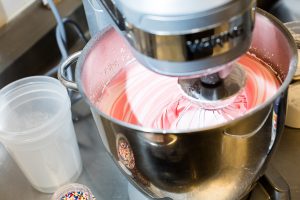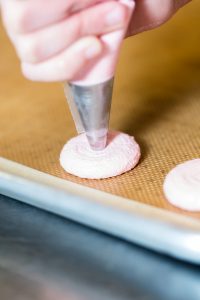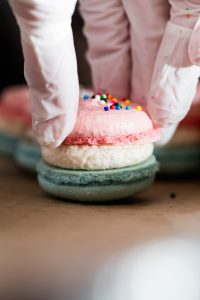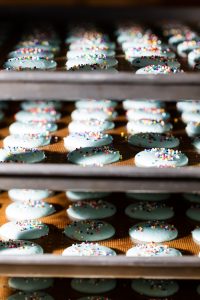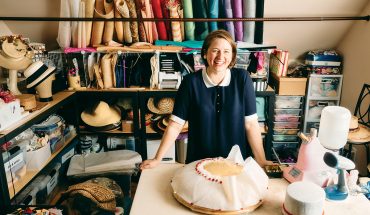by Liza Roberts
photographs by Keith Isaacs
The macarons have their own fan club. Pink and blue and green and red and purple and toffee-hued, half a dozen varieties beckon like jewels from the cabinet at the downtown pastry shop lucettegrace. Countless regulars come daily for their fix; hundreds of the cookies go out the door every day. The shop on Salisbury Street is also known for its refined and inventive desserts; its breads, cakes, and lunches. But the crunchy, chewy, creamy, intensely flavored meringue-based cookies are its calling card.
One recent morning, Daniel Benjamin, the shop’s chef and owner, spent an hour methodically wrapping macaron ice cream sandwiches in waxed paper as his staff mixed and baked and cut and stirred around him in their window-walled, open kitchen. Soft-spoken in a grey T-shirt, jeans, and white apron, Benjamin told the story of the culinary travels that took him across the country and back again before settling in Raleigh and opening this successful pastry shop. As he folded and wrapped and lined up rows of frozen sandwiches, he admitted: This kind of repetitive task is actually one of his favorite things to do.
It makes sense. Baking is like that – meditative, meticulous. The former Herons pastry chef learned about baking and French pastry at the famed François Payard patisserie in New York in the late ’90s. An evening student at the French Culinary Institute at the time, Benjamin spent his days at Payard filling macarons and preparing the elegant French jelly desserts known as pâte de fruits.
The job was the fulfillment of a dream born the day Benjamin picked up the now-defunct Pastry Art and Design magazine and read about the acclaimed Parisian baker and his new New York outpost. At the time, Benjamin was working a series of restaurant jobs in his hometown of Valparaiso, Ind., an hour east of Chicago. “It’s a pretty small town,” he says. “I used to say we had two pastry shops: the grocery store and the Dunkin’ Donuts.” But even then, Benjamin was teaching himself how to cook. He’d been doing it for years.
As a preteen, he’d watch The Galloping Gourmet on PBS, scribble down Graham Kerr’s recipes, then cook them for his five siblings and his single mom. He read cookbooks and experimented. When he could drive, he found jobs in the kitchens of the local country club, a ’50s diner, an Irish pub. He decided that the controlled, relatively peaceful world of pastry appealed to him more than the heat and intensity of the rest of the kitchen. He would be a pastry chef.
Dream job
As soon as Benjamin arrived to New York at 19, he had a plan. He would take the subway from his student housing in Brooklyn Heights to Payard on the Upper East Side of Manhattan and ask for a job. But the day he went was a Sunday, and the patisserie was closed. “I looked at the cakes in the display case in the window,” he recalls. They were exquisite. “And I thought: I could never work here. So I didn’t go back.”
Instead he found a job at an unintimidating Cobble Hill bakery, and got busy. But months of making paté and French onion soup – not pastry – left him frustrated. He “picked up the courage” to go back to the famed French patisserie. This time, he went on a weekday, arriving so early he had to walk around the block several times before the door opened. When it did, he offered to work for free, was hired, and immediately got to work. “It was amazing,” he says. “It was so amazing to me that I looked at dropping out of school. If I didn’t have the fear of losing my student housing, I might have dropped out.”
He didn’t; he finished his degree, then promptly fled New York’s high cost of living to take a job in Naples, Fla. with Norman Love, executive pastry chef for The Ritz-Carlton (he’d read about Love in Pastry Art and Design as well). There, Benjamin continued to learn, made a “scary” amount of key lime pie, then followed his wanderlust west. A stint in a free-spirited Squaw Valley, Calif. kitchen had him yearning for the structure he’d left behind – which he then found in Chicago, New Orleans, and Washington, D.C. – and eventually here in Cary, helping to open the restaurant at a luxury hotel-in-the-making: The Umstead Hotel & Spa.
“It was a glorious experience,” he says. Immediately successful and celebrated with five stars, the restaurant, Herons, gave Benjamin free rein to explore his creativity, which he did for seven years. It was then, in 2014, that he decided that if he was ever going to start something of his own, he couldn’t wait much longer.
‘Everyday luxury’
“I wanted something that was for everyone,” Benjamin says, “with a price point that is an everyday luxury: the price of a beer, or a coffee, or a cocktail.” His vision was informed in part by a visit his brother made to Payard years earlier, when he seemed visibly uncomfortable in the patisserie’s formal setting. Benjamin wanted his own shop to put people at ease with its décor and with its prices. “I don’t know that I’ve hit it perfectly yet, but (I aim to) have something for everyone, and not just classic things, but things that are rooted in classic technique.”
He named the place with the help of his wife, Andrea Densmore, by combining the middle names of their two daughters, Adelaide Grace, now 8, and Eloise Lucette, now 4. At the beginning, the biggest challenge was to figure out how much pastry to make. The shop was sold-out every day for the first several weeks, which had Benjamin and a skeleton crew up all night every night to fill the case for the following day.
Two-and-a-half years later, the rhythms of demand are more predictable; the staff of 16 has a steady pace and a routine. Lunch – once a small part of the business – has grown significantly, especially since Benjamin posted large chalkboard menus outlining its offerings. Seasonal offerings like bûches de noël for Christmas, king cakes for Mardi Gras, and fanciful Valentine treats – the line was practically out the door on Feb. 14 – keep things interesting.
Now, even as his business grows, Benjamin gets a lot more sleep, and, when he’s not dreaming up delicacies like the six-
layered chestnut tart or the elegant lemon cream pie cake that are currently in the case, he takes pleasure in simple tasks: filling pie shells, wrapping ice cream sandwiches, meeting the regulars. They surprised him by presenting themselves from the start, and their numbers continue to grow. “Things are going well,” Benjamin concedes. “I don’t want to say the place runs itself, it doesn’t. But it’s more efficient now. The fact that I don’t have to do everything is big. I have a good day when I can just wash dishes.”
Which doesn’t mean he’s ready to expand. He says he’s having fun with the business, and enjoying partnerships like the one he’s forged with his brother, David Benjamin, who moved to North Carolina and is now a farmer in Hillsborough. David’s Vera Luce Farm produce regularly makes its way on to the lucettegrace menu: His sweet potatoes are in the soup that’s currently on offering; last summer his tomatoes made for juicy BLTs.
As he speaks, Daniel Benjamin, seldom idle, has his hands busy pressing dough into small tart pans (above). “This is one of my favorite things to do,” he says, picking up a disc of dough, pressing it into a petite pan, cutting off the excess, and then doing it again, and again – without looking. “It’s almost like muscle memory.” He looks out the kitchen window to the front counter, where people peer into the pastry case, and beyond them to the sunny, busy downtown street. “I can think about menus, I can look out the window, I can see people.” On the counter before him, filled tart pans are lining up, one by one, row by row.



